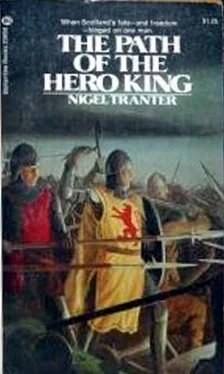After Stirling Bridge. He refused me. I swore that one day I would repay his insults. Pray God and all His saints for me, Gibbie, that this may be the day!
The other mumbled something indistinct.
He is worse than Percy. A black-hearted savage! For the challenge I made him, he crucified all Annandale. Slew 2000 of my people. Burned Annan and a score of villages. Tortured, raped, trampled. And now he rides there!
Sire-he is an evil man. But a notable commander. If you will not retire, at least give the signal to move!
I said that I would let them come level with the Maiden Isle. They are not there yet. All depends on timing, man …
At length the glittering head of the colourful array reached the
vicinity of the islet, two-thirds of the way up the loch. Bruce turned
and waved to the first of a hidden chain of cater ans
Reaction was not long in manifesting itself. From the woodland at me head of the loch, about a mile in front of the English, Boyds party streamed out, in flight, heading south by east for the loch-shore track, a mixed company of some fifty mounted men herding about eighty dismounted prisoners.
Even at that distance, across the water, the watchers could hear the shouts of Cliffords men as they saw their quarry. Equally evident was the sudden increase of pace, as the leaders spurred to the chase. Bruce nodded grimly.
Now they must wait again, a tenser and even more taxing waiting, while they watched the drama unfold. Timing was indeed of the essence, yet so much was unpredictable and might go wrong. It demanded an iron resolution to sit there and do nothing, to withhold the next signal until the precise momentwhich might well never come.
It was all a matter of pace and distance and ground; the contrasting
paces of a fast-riding pursuit and a slow-moving huddle of dismounted
prisoners; of a gap between, short enough to lure on the former beyond all hesitation, yet long enough to allow the latter to be kept ahead until the next stage of the programme; and this situation affected, complicated, by the fact that, in the woods which Boyds party had just left, was the hidden barrier of the locks main feeder-river to be got over bridge less and the marshlands of the loch-head beyond, difficult for horsemen.
So that, although the English van made up on the Scots at a great rate, reaching the loch-head trees while Boyd and Fleming were still ploutering with their charges through the bogs less than half a mile ahead, it was a little longer before Clifford and his knights emerged from the trees again, into view. And meanwhile there occurred behind them a great pile-up of the long English train, and not a little confusion.
The marshland forced Clifford to a walking pace and to practically single-file progress. Even so, he was into its emerald-green uncertainty before Boyds party was out at the other side, no more than 500 yards separating them now.
But thereafter the going improved, as the Scots and their unhappy captives gained the firm though narrow loch side track.
Driving the prisoners like a flock of unwilling sheep, shouting and beating them with the flats of their swords, the Annandale moss troopers hurried them along, while behind them the trumpets shrilled, neighing cavalry orders.
Sir Gilbert Hay could not keep still, in his alarm and concern, biting his nails and declaring that disaster was inevitable unless there was a miracle, that the English must catch up far too soon for their project to work. The King should blow his horn now, and let Boyd and his men save themselves at least and leave the damned prisoners. Clifford would still pursue … Bruce did not so much as glance at him.
Clifford was no fool. When he and his nearest won Out of the marsh and on to the start of the track, he was little more than a quarter-mile from his quarry. But behind him only a sparse, attenuated thread of men were picking their way through the quaking water-meadows as yet, most of his host still hidden by the woods, some even still in sight beyond, held up in the queue to cross the river. The watchers could almost see him fuming there, a splendid figure in colourful heraldic surcoat over shining armour, magnificently mounted, the blue-and-gold plumes of his helmet tossing, while his numbers so slowly grew.
Bruce and Hay could see, now, that the enemy was not so stupid as to make a wholly blind and headlong advance through this obviously dangerous country. A fair-sized column had detached itself, and now emerged from the trees to the northwards following the river up to where it split into the two tributary glens-obviously to stop any flank attack from that quarter. Clifford would well know that the fifty or so herding the prisoners was not all Bruces force.
Campbell was up there in the right-hand glen. But Campbell had his instructions-and at least he had hill men as his little force, Annandale moss troopers not low-country heavy cavalry.
Boyd was now almost directly below Bruce and his waiting Islesmen. A few of the prisoners had fallen by the way, jumped or been pushed down to the shore or into the water, and had been left. But the great majority were still being herded along southwards.
Clifford was displaying exemplary patience. He could see, of course, the entire empty flank of Muldonach Hill ahead of him and of his quarry, and would reckon time to be very much on his side.
Slowly his following was catching up with him.
When, at length, a trumpet announced the resumption of the advance, he still did not hurry off at a canter. The narrowness of the track meant that they could not ride more than two abreast, sometimes not even that. Any rush along it would mean only a few reaching the Scots unsupported. A slow trot would serve them well enough.
Hay, in his efforts to report exactly how far both Boyd and the enemy had got, down below, was in danger of showing himself, and was sharply rebuked by the otherwise silent monarch.
But they are within bowshot of Boyd now, he exclaimed.
Clifford is almost directly below. Almost upon them. Another minute or so and it will be all over!
Not so. Clifford and his knights do not use bows and arrows!
Boyd knew his task-a sound veteran. He will draw them along until the last moment. Minutes yet. Even then he will put the prisoners between him and Clifford-a hold-up on that path.
Bruce had drawn himself forward in the heather, to peer over and down.
Wait you, Gibbie. How much of a commanders task is but waiting!
No more than 200 yards now separated the tail of one party from the head of the other. Boyd was stretching it manfully. The climax could not be long delayed now; but every second counted, with more and more English committed to that hillside path.
Boyd made his move. Abandoning the captives at last, he pulled out his men, past and through them, and trotted on beyond-but even now not at top speed.
The prisoners promptly turned to face the other way. But if they
expected any rapturous welcome from the rescuers, they were
disappointed Cliffords shouts to them to get off the track and out of the way could be heard right up at the high terrace.
They did not do so with any alacrity, perhaps understandably, and there was a certain amount of delay and disorder as the pursuit reached them. More men went rolling down the steep bank, amidst curses and shrill cries of protest. Then Clifford was through, his pace increased to a canter, after the fleeing Scots.
Bruce was almost counting the yards now. Boyd was nearing the ravine where Edward was hidden. He was to ride straight on, over the burn and past. But the English could hardly fail to notice the hoof-marks of Edwards company turning off. Then would be the moment of truth.
Clifford was out of sight of Bruces position now, his long tail of men stretched across the wide skirts of the hill. How to tell the precise moment? Whether he would in fact rum in, on Edward, go on after Boydor take fright, and send back warning, so that full surprise would be lost?
Читать дальше












